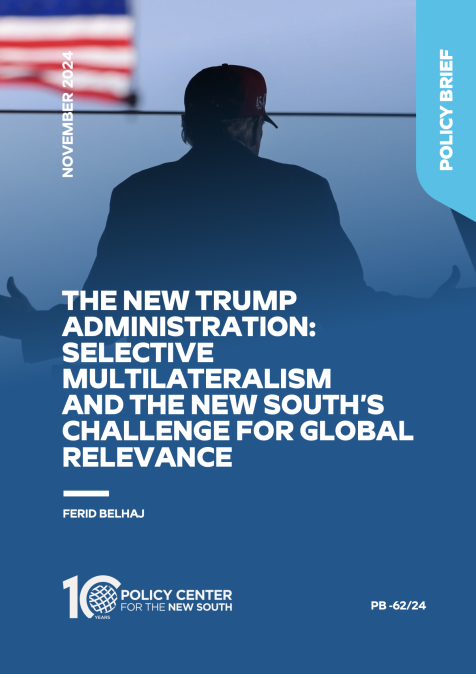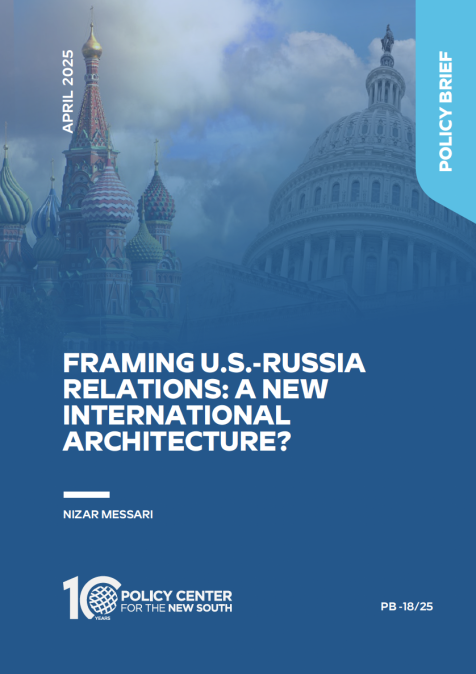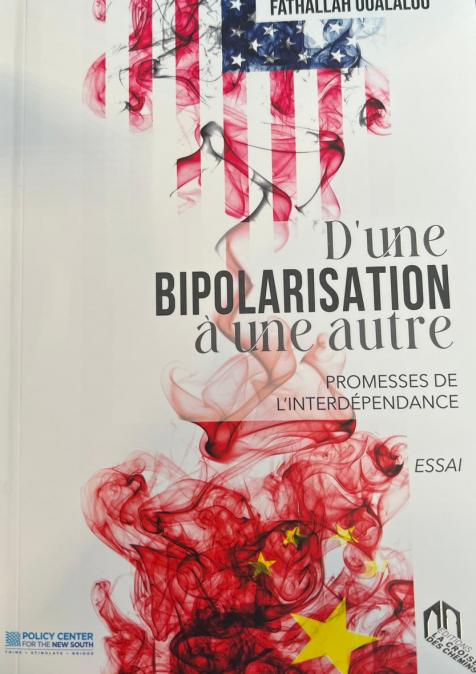Publications /
Policy Brief
This essay examines the implications of the new Trump administration’s ‘America First’ approach for multilateralism, particularly in the context of the Bretton Woods institutions and the World Trade Organization (WTO), and its consequences for the New South. The first Trump administration’s selective multilateralism, marked by the prioritization of U.S. interests over global cooperation, contributed to a more fragmented global order. This was seen in the administration’s withdrawal from multilateral agreements, undermining of global institutions, and reshaping of international trade and development frameworks. But despite his general skepticism toward multilateralism, Trump maintained conditional support for the International Monetary Fund (IMF) and World Bank when aligned with U.S. geopolitical priorities, demonstrating a pragmatic approach to global governance. The essay argues that this selective engagement has created an uncertain environment for developing economies in the New South, as they navigate a system in which U.S. support is increasingly contingent on political alignment. It argues that this shift could also unlock new opportunities for major players in the New South, enabling them to shape global development agendas beyond mere marginal influence. The paper concludes by assessing the potential trajectories of U.S. foreign policy under a second Trump administration and the implications for global governance, emphasizing the challenges and opportunities for the New South in a more multipolar world.
America First, World Last: The New South in Trump’s Selective Multilateralism
As a new U.S. administration prepares to take office, attention is turning to what a ‘Trump 47’ mandate may mean for economic multilateralism, and its impact on the New South. Historically, U.S.-led multilateral institutions—the International Monetary Fund, World Bank, and World Trade Organization—have anchored the global order, promoting stability, open markets, and development aid. But Trump’s ‘America First’ policy has marked a sharp break from tradition, emphasizing national sovereignty over collective commitments. In his 2018 address to the United Nations, Trump underscored this shift: “Each of us here today is the emissary of a distinct culture, a rich history, and a people bound together by ties of memory, tradition, and the values that make our homelands like nowhere else on Earth. That is why America will always choose independence and cooperation over global governance, control, and domination. I honor the right of every nation in this room to pursue its own customs, beliefs, and traditions. The United States will not tell you how to live or work or worship. We only ask that you honor our sovereignty in return.”
Yet Trump’s approach to multilateralism has been often nuanced.While he challenged the WTO’s dispute resolution process, stalling its functions, he selectively backed the IMF and World Bank when their agendas served U.S. interests. This selective multilateralism created challenges for developing economies, especially in the New South, which relies on the Bretton Woods institutions for critical financing and trade-dispute mechanisms.
For the New South, this shift signals an increasingly transactional international system, with U.S. support conditioned on strategic alignment. As a result, countries may look toward China’s Belt and Road Initiative and other alternative funding sources that offer fewer political strings. In a more fragmented world order, major players in the New South could seize new opportunities to shape global development agendas beyond mere marginal influence.
The second Trump mandate could deepen this pivot, reshaping multilateralism in ways that redefine economic partnerships based on strategic alignment rather than universal norms. For the New South, navigating this new reality may become essential to securing its economic and geopolitical future.
Historical Overview of U.S. Multilateralism and the Bretton Woods System
The Bretton Woods system, established in 1944, laid the foundation for a global economic order underpinned by cooperative frameworks. This system, named after the conference held in Bretton Woods, New Hampshire, was intended to prevent economic instability and protect against the kinds of financial crises that led to the Great Depression and global conflicts in the early twentieth century. The IMF and the World Bank were created to provide financial stability and development aid, respectively, while the General Agreement on Tariffs and Trade (GATT), later transformed into the WTO, aimed to foster open and fair global trade.
U.S. leadership was central to the creation and operationalization of these institutions. As historian G. John Ikenberry argued in Liberal Leviathan, the U.S. used these institutions to create a liberal economic order that both stabilized and legitimized its global influence. Through the IMF, the U.S. could exercise financial influence in times of global economic downturns; through the World Bank, it could support development in war-torn and emerging economies. The WTO, meanwhile, provided a structured forum for management of global trade disputes, helping to foster predictability and openness in international commerce.
The U.S.’s longstanding support for these institutions reflected a view that multilateralism was a means to safeguard American interests within a stable, rules-based order. As the world’s largest economy, the U.S. wielded significant influence over the governance and policy choices of the IMF, World Bank, and WTO. This influence expanded U.S. economic reach and allowed it to set global standards on trade, finance, and development. Consequently, U.S.-led multilateralism served both as a tool for economic diplomacy and a means of maintaining global stability.
However, as the global landscape shifted in the early twenty-first century, with the rise of emerging powers such as China, calls for reform of these institutions grew louder. Emerging economies argued for a system that better reflects a multipolar world, challenging the Bretton Woods system’s U.S.-centric model.
Nonetheless, until the Trump administration, the U.S. largely maintained its commitment to multilateralism, supporting incremental reforms within these institutions rather than abandoning them.
The Trump Administration’s ‘America First’ Approach to Multilateralism
The ‘Trump 45’ administration’s ‘America First’ doctrine brought a marked shift in how the U.S. interacted with multilateral institutions. Driven by a perception that multilateralism often placed American interests second to global priorities, Trump repeatedly voiced skepticism about multilateral institutions and agreements. This stance was evident in several key decisions, including the withdrawal from the Paris Agreement on climate change, and the renegotiation of the North American Free Trade Agreement (NAFTA), which Trump replaced with the U.S.-Mexico-Canada Agreement (USMCA).
At the WTO, the U.S. approach under Trump was particularly disruptive. Believing that WTO rules unfairly disadvantaged the U.S., Trump challenged the organization’s relevance and utility, particularly its dispute settlement system. By blocking the appointment of judges to the WTO’s Appellate Body, the Trump administration effectively paralyzed the WTO’s core function of adjudicating trade disputes. The absence of a functioning dispute-resolution mechanism created uncertainty in the global trading system, as countries lost an agreed forum for resolving conflicts (Blustein, 2019). This move marked a significant shift in U.S. policy, signaling a willingness to bypass established trade norms, and signaling skepticism about the utility of multilateral trade governance.
Moreover, Trump’s preference for bilateral trade negotiations over multilateral agreements reflected his administration’s desire for direct control and leverage. Bilateral deals, in Trump’s view, allow the U.S. to secure terms more favorable to its interests than multilateral frameworks constrained by global standards. An established economic literature highlights this as a return to economic nationalism, with the U.S. prioritizing strategic relationships with individual countries over broader commitments to global economic cooperation. This shift from multilateral to bilateral engagement illustrates the Trump administration’s inclination toward a transactional, rather than cooperative, approach to international relations.
A Nuanced Approach to the Bretton Woods Institutions
Despite President Trump’s general skepticism toward multilateralism, his first administration exhibited a more complex stance toward the Bretton Woods institutions: the World Bank and the IMF. Although Trump’s rhetoric often disparaged multilateral organizations, he ultimately approved measures that reinforced U.S. support for both the World Bank and IMF, albeit with conditions that aligned with American strategic priorities. This selective support reflects a nuanced approach: Trump’s administration used these institutions to bolster U.S. influence, particularly in balancing against the perceived or reality of China’s expanding global reach.
In 2018, the Trump administration backed a $13 billion capital increase for the World Bank, the first in several years, a decision that signaled continued U.S. commitment to global development financing. However, this support was not unconditional. The Trump administration demanded various far-reaching reforms, including lending shifts to reduce financing for higher-income countries, improved operational efficiency and cost-cutting measures within the bank, greater transparency in lending practices and results, and support initiatives that would promote economic self-reliance in recipient countries, reducing reliance on international aid over time.
Similarly, Trump’s administration maintained support for the IMF, particularly when it came to financing stability in countries critical to U.S. geopolitical interests. In 2019, the IMF approved a substantial bailout package for Argentina, largely because of U.S. support, despite concerns about the country’s economic stability and past debt challenges. This move underscored the Trump administration’s willingness to use the IMF to extend American influence, particularly in Latin America, a region traditionally within the U.S. sphere of influence. As argued by Joseph Stiglitz, Trump’s selective support for the IMF may have also served as a counterweight to China’s Belt and Road Initiative (BRI), which has expanded China’s influence in regions including Latin America and Africa. By backing IMF interventions in strategic areas, the administration positioned the U.S. as a defender of financial stability and an alternative to Chinese investment.
Trump’s approach to the Bretton Woods institutions illustrates his administration’s pragmatism in using multilateralism selectively to advance national interests. His Administration’s support for the World Bank and IMF demonstrates that his approach was a form of ‘conditional multilateralism’, through which the U.S. continued to back multilateral organizations when they aligned with specific strategic goals.
Geopolitical Aspects and the Shift Toward Multipolarity
The Trump administration’s selective engagement with multilateral institutions accelerated the global shift toward a multipolar order, in which power is distributed across several influential states rather than concentrated within a single hegemon. As the U.S. disengaged from traditional multilateral frameworks, including the WTO, World Health Organization, UN Human Rights Council, and Paris Agreement, other powers, particularly China, expanded their roles within global governance structures, creating alternative institutions that challenged the Bretton Woods system. This shift toward multipolarity underscores the broader geopolitical implications of Trump’s approach to multilateralism.
China’s response to the U.S.’s retreat from multilateral leadership was proactive. In 2014, China established the Asian Infrastructure Investment Bank (AIIB) as one alternative to the World Bank, with a focus on infrastructure projects across Asia and beyond. The AIIB, along with China’s BRI, provide alternative financing for developing countries that feel somewhat underserved by the Bretton Woods institutions, positioning China as a viable alternative to perceived Western-dominated financial institutions. As a result, the AIIB gained significant support globally, with over 100 member states joining, including U.S. allies such as the United Kingdom—the first Western country to join—and Germany. The establishment of these institutions represents a shift in the balance of power in international development finance. Countries now have more options open to them.
Furthermore, China has expanded its influence within existing multilateral institutions. At the UN, for example, China has increased its contributions to peacekeeping operations and taken on more leadership roles in various UN agencies, including the WHO and the International Telecommunication Union, in addition to its quasi statutory control of the UN Department of Economic and Social Affairs. This deepening of its involvement in these organizations has gained China more leverage in shaping multilateral norms in ways that reflect its interests and values, often at odds with U.S. and western priorities, broadly defined.
Trump’s selective multilateralism has thus contributed to a fragmented global order. This shift challenges the traditional U.S.-led liberal order and complicates future efforts to address global issues, including climate change, migration, trans-boundary health issues, and economic inequality, which require robust and coordinated multilateral responses.
The Potential Approach of the Second Trump Administration
Based on his first term, the approach of the second Trump administration to multilateralism and the Bretton Woods institutions would likely blend skepticism with pragmatism, closely tailored to U.S. interests. With the global landscape shifting further toward multipolarity, a ‘Trump 47’ administration would confront a new set of challenges, likely amplifying its emphasis on conditional multilateralism, with U.S. engagement with international bodies hinging explicitly on reciprocal benefits.
In his second term, Trump could adopt a more assertive stance on recalibrating U.S. commitments to the IMF and the World Bank. While these institutions may still receive U.S. support, the administration would likely push for greater lending transparency, particularly for nations heavily indebted to China through initiatives such as the BRI. Trump’s previous stance on the World Bank’s 2018 capital increase—paired with demands for limits on lending to middle-income countries like China—suggests a more vigorous push for reforms designed to counter Beijing’s influence. Economists such as Joseph Stiglitz view these demands as signaling a U.S. bid to make the Bretton Woods institutions a more competitive alternative to Chinese financing for developing economies.
At the WTO, the second Trump term—assuming continued U.S. membership—might push for deep structural reforms, or explore alternative trade-dispute mechanisms. The administration would likely prioritize reshaping the organization along more U.S.-centric lines, aligning enforcement tools more closely with American interests. If comprehensive reforms prove unattainable, the U.S. may accelerate its pivot toward bilateral and regional trade deals, potentially further weakening the WTO’s role in the global trade system.
On multilateral funding mechanisms supporting global initiatives such as climate adaptation, the Trump 47 administration would likely adopt a more confrontational approach. Trump’s previous withdrawal from the Paris Agreement reflected an unwillingness to participate in environmental accords perceived as economically burdensome for the U.S. As former Secretary of State Mike Pompeo noted in a state Department Press Release on November 4, 2019, Trump exited the Paris Accord to avoid “the unfair economic burden imposed on American workers, businesses, and taxpayers.” Many observers now anticipate that the new Trump administration will again exit the Paris Agreement, reversing President Biden’s re-engagement. Yet with climate change now a focal issue, especially for emerging economies in the New South, the Trump administration may come under pressure to address these concerns strategically rather through a hatchet policy. Trump 47 might opt for bilateral energy partnerships and regional initiatives over expansive global commitments, selectively engaging in climate finance to safeguard U.S. energy interests, while countering China’s energy diplomacy in regions including Africa and Latin America.
In sum, the second Trump administration would likely reinforce conditional multilateralism, prioritizing U.S. interests while selectively backing or restructuring key multilateral institutions. This approach would reflect a longstanding view of global engagement as a tool of leverage, rather than a steadfast commitment to global public goods. Indeed, while these institutions were framed as mechanisms for global stability and economic growth, they have often aligned closely with U.S. priorities. A new orientation would have profound implications for developing countries.
Implications for the New South
The Trump administration’s selective approach to multilateralism, especially in relation to the Bretton Woods institutions and the WTO, has significant implications for developing nations, particularly those in the New South. Many of these economies rely on the IMF and World Bank for financing to support infrastructure, economic stability, and responses to global challenges, such as climate change and health crises. By limiting unconditional support for these institutions, the U.S. could restrict developing countries’ access to essential funding, and reduce their influence within multilateral frameworks. However, this shift could also unlock new opportunities for major players in the New South, allowing them to shape global development agendas beyond mere marginal influence. This pivot may drive these nations toward alternative financing options, particularly from China.
One immediate consequence of the stance of Trump’s first administration has been the rising appeal of China’s BRI, which offered developing nations access to funding with fewer conditions than the IMF or World Bank. As of August 2023, about 150 countries had signed up to the initiative. The BRI continues to serve as a valuable platform for developing President Xi’s ambitions as a world leader. The BRI is also an opportunity to export Chinese goods to countries that are not affluent, and to extract natural resources from those developing nations. The data suggests that Asia, Africa, and Latin America have become important destinations for commodity exports, accounting for about 21% of China’s total exports in 2022, according to official Chinese government figures (Zhang - GIS 2024).
With limited U.S. backing for multilateral development institutions, many countries are turning to these alternative sources. However, and while an increasing number of analysts argue that these concerns may be overstated, China’s financing has raised issues over debt sustainability, with fears of ‘debt-trap diplomacy’ looming large.
On trade, Trump’s approach to the WTO poses specific challenges for developing economies that depend on stable and predictable trade regimes. As outlined above, by undermining the Appellate Body and favoring bilateral deals, the administration has undermined the WTO’s role as a guarantor of fair trading practices. For developing nations, the weakening of a robust dispute-resolution mechanism removes a crucial tool for challenging the unfair practices of larger economies. This erosion of WTO effectiveness could leave smaller economies vulnerable to one-sided terms in bilateral agreements, because they lack the leverage afforded by multilateral forums.
Trump’s selective support for climate finance also strains developing countries, especially those that are highly vulnerable to climate risks. His first administration’s withdrawal from the Paris Agreement and reduced contributions to global climate funds put multilateral climate efforts under pressure, complicating access to adequate adaptation financing. If the second Trump administration were to continue down this path, developing nations may increasingly rely on bilateral climate agreements, which might lack the scale of funding required for comprehensive adaptation.
Finally, Trump’s conditional multilateralism risks undermining trust in U.S. commitments to development finance, particularly in strategically important regions. A more transactional U.S. approach may encourage developing nations to seek reliable partnerships that offer consistent support without extensive conditions. This potential shift could solidify a multipolar global order, as developing nations diversify alliances and look increasingly to regional powers including China, India, and Russia, to reduce dependence on the U.S.
Conclusion
The first Trump administration’s multilateral legacy marked a sharp break from the U.S.’s traditional role as a global leader in institutional cooperation. Embracing an ‘America First’ stance, Trump backed the Bretton Woods institutions selectively while sidelining others such as the WTO,advancing a pragmatic, conditional multilateralism that put U.S. interests above wider global obligations. This selective approach has reshaped the global order, opening space for rising powers such as China to step in, creating alternative institutions and financing channels that offer developing countries new options for support.
The second Trump administration would likely deepen the shift toward a transactional model of global engagement, prioritizing U.S. commitments within multilateral institutions only when they align with American objectives. This approach could further erode the WTO’s influence in global trade, steer the IMF and World Bank to more closely reflect U.S. policy aims, and curtail U.S. involvement in international climate initiatives. For developing nations, the stakes are high, as they confront an increasingly fragmented multilateral landscape in which access to resources hinges more on geopolitical allegiance than on universal membership.
In this multipolar era, the challenge for New South countries will be to navigate the rivalry between traditional multilateral frameworks led by the U.S. and Europe, and the growing influence of China and other regional powers. The Trump administration’s selective approach to multilateralism has set the stage for a more complex and competitive global order, in which the tenets of cooperation are dictated by the strategic interests of powerful states. This underscores the need to adapt to a shifting paradigm in which multilateralism is no longer a constant, but is a dynamic tool shaped by national priorities.
References
- Blustein, P. (2019). Schism: China, America, and the Fracturing of the Global Trading System. Brookings Institution Press.
- Pompeo, M. (2019, November 4). Remarks on U.S. Withdrawal from the Paris Climate Agreement. U.S. Department of State.
- The Economist (2020). Trump’s Trade Wars: Where Does the U.S. Stand?.
- Ikenberry, G. J. (2011). Liberal Leviathan: The Origins, Crisis, and Transformation of the American World Order. Princeton University Press.
- Stiglitz, J. E. (2019). Globalization and Its Discontents Revisited: Anti-Globalization in the Era of Trump. W.W. Norton & Company
- Cheng, S. (2020). China’s Belt and Road Initiative: A New Global Economic Order?. Asian Economic Policy Review, 15(1), 19-36.
- Junhua Zhang Geopolitical Intelligence Services (GIS) 2024.








